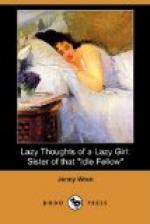A little while ago we used to have grand steeplechases with our dogs. We put up fences and water jumps, all of which—with the aid of sugar again—they were able to master in time. I think they used to get quite excited themselves at last. Our old gardener, who used to watch the races with great interest, told me once that he “’ad seen one of the little dawgs a’jumpin’ backwards and forwards over that ’ere bit of wood (the highest and most perilous jump), and a’practisin’ by hisself!” He was a very clever “little dawg,” but I don’t think he ever reached such a pitch of intelligence as to practice “by hisself.”
We had to fill up the fences down to the ground, or, to save themselves the trouble of getting over, they would run under or scramble through in some extraordinary fashion, which in the end took much the most time and pains. Humanity again! Lazy people always take the most trouble!
When I was a little girl I had every morning to learn and repeat to my governess three verses from a French Bible. I thought I had hit upon an easy way of getting over this, and of reducing the quantity I had to commit to memory; so I chose the cxxxvi. Psalm, in which you will find, if you care to look it up (I have just had to do the same to find out the number, not being by any means a living concordance to the Psalms!)—you will find that half of each verse is composed of the words, “For His mercy endureth for ever.” Ingenuity wasted! Trouble increased! Not one whit the better off was I. Until that Psalm was finished I had to learn six verses instead of three. I retired anything but satisfied, and heartily wishing I had left that Psalm alone. It was very mean of my governess all the same. She should better have appreciated the craftiness of her pupil. But, poor things, they have to be very sharp and always on the look-out, or the children will take them in; they will not let any opportunity escape them, and, indeed, I pity anyone who has the care of these unraveled Sphinxes, these uncut Gordian knots.
CHAPTER X.
ON CONCERTS.
I am not thinking about the Albert Hall Concerts, where the highest in the musical world go time after time, always singing the same songs.
Neither am I thinking of “Monday Pops,” and purely classical concerts, to which at least half the audience listens with closed eyes and thoughts somewhere in dreamland. They like to be thought musical; they know they ought to appreciate such renderings of such compositions; and after all, when they describe “the treat they had! such a perfect touch, my dear! and the execution!!—” no one knows they have never heard a note, so what does their inattention matter. They have been seen there, and that is all they care about.
No, my thoughts take a much lower range. They are intent on only amateur productions, from penny readings upwards, to those superintended by the elite of the neighborhood, when the seats rise in price to five shillings each.




